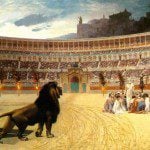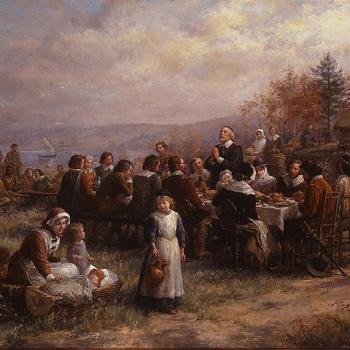
An astute reader of this blog who goes under the moniker of dCyl — I know his identity, and have even met him, but don’t feel authorized to use his real name here — has prompted me to return to commenting upon the brief sixth chapter of the Acts of the Apostles:
I may be reading too much into this, but I note that the hostile synagogues were all Hellenic synagogues, not Hebrew. I think some of the disgruntled Hellenic Christians returned to their old synagogues and stirred up trouble. And what trouble! At this point, there is a fragile modus vivendi brokered by Gamaliel, a man honored by Jew and Christian alike, under which the Church is doing pretty well. This dispute destroys that, brings in real persecution, scatters the apostles, has Peter hiding out for his life in Joppa, but also bring Paul into the picture.
I don’t think that he’s reading too much into the narrative.
Remember that Acts 6:1 reads as follows (in the English Standard Version):
Now in these days when the disciples were increasing in number, a complaint by the Hellenists arose against the Hebrews because their widows were being neglected in the daily distribution.
Acts 6:1-7 identifies the problem and tells how the apostolic leadership of the fledgling Church moved to meet it. (See my brief discussion at “Infighting in Acts 6.”)
Now, we don’t know that “some of the disgruntled Hellenic Christians returned to their old synagogues and stirred up trouble,” but it would scarcely be surprising that some of the “Hellenists” fell away. And, if they returned to Jewish synagogues, those listed in 6:9 (“the synagogue of the Freedmen (as it was called), and of the Cyrenians, and of the Alexandrians, and of those from Cilicia and Asia”) would have been precisely the ones to which they would very likely have returned.
Moreover, we have learned from sad experience that alienated former believers — apostates, in other words — are often the very most bitter enemies of the faith that they themselves once embraced and then rejected. This has been observed by the prophets, as well:
And thus we can plainly discern that after a people have been once enlightened by the Spirit of God, and have had great knowledge of things pertaining to righteousness, and then have fallen away into sin and transgression, they become more hardened, and thus their state becomes worse than though they had never known these things. (Alma 24:30)
Strange as it may appear at first thought, yet it is no less strange than true, that notwithstanding all the professed determination to live godly, apostates after turning from the faith of Christ, unless they have speedily repented, have sooner or later fallen into the snares of the wicked one, and have been left destitute of the Spirit of God, to manifest their wickedness in the eyes of multitudes. From apostates the faithful have received the severest persecutions. Judas was rebuked and immediately betrayed his Lord into the hands of His enemies, because Satan entered into him.
There is a superior intelligence bestowed upon such as obey the Gospel with full purpose of heart, which, if sinned against, the apostate is left naked and destitute of the Spirit of God, and he is, in truth, nigh unto cursing, and his end is to be burned. When once that light which was in them is taken from them they become as much darkened as they were previously enlightened, and then, no marvel, if all their power should be enlisted against the truth, and they, Judas-like, seek the destruction of those who were their greatest benefactors.
What nearer friend on earth, or in heaven, had Judas than the Savior? And his first object was to destroy Him. Who, among all the Saints in these last days, can consider himself as good as our Lord? Who is as perfect? Who is as pure? Who is as holy as He was? Are they to be found? He never transgressed or broke a commandment or law of heaven—no deceit was in His mouth, neither was guile found in His heart. And yet one that ate with Him, who had often drunk of the same cup, was the first to lift up his heel against Him. Where is one like Christ? He cannot be found on earth. Then why should His followers complain, if from those whom they once called brethren, and considered as standing in the nearest relation in the everlasting covenant, they should receive persecution?
From what source emanated the principle which has ever been manifested by apostates from the true Church to persecute with double diligence, and seek with double perseverance, to destroy those whom they once professed to love, with whom they once communed, and with whom they once covenanted to strive with every power in righteousness to obtain the rest of God? Perhaps our brethren will say the same that caused Satan to seek to overthrow the kingdom of God, because he himself was evil, and God’s kingdom is holy. (History of the Church 2:22-23)
There have always been, in every age of the church, those who have been opposed to the principles of virtue, who have loved the gain of this present world, followed the principles of unrighteousness, and have been the enemies of truth. … Those who have associated with us and made the greatest professions of friendship, have frequently been our greatest enemies and our most determined foes; if they became unpopular, if their interest or dignity was touched, or if they were detected in their iniquity, they were always the first to raise the hand of persecution, to calumniate [make false charges about] and vilify their brethren, and to seek the downfall and destruction of their friends. (Times and Seasons 3:868)
It isn’t coincidental that the death of Stephen, the first Christian martyr, follows immediately in Acts 7, nor that a young Greek-speaking Jewish man named Saul of Tarsus — a city located in ancient Cilicia (one of the very places mentioned in Acts 6:9, cited above, which may well have had its own separate synagogue in Jerusalem) — was standing helpfully and approvingly by during Stephen’s killing (Acts 7:58, 8:1). Happily, the Lord was able to make something very good out of that situation.












